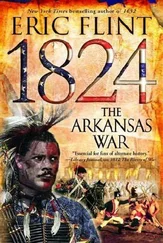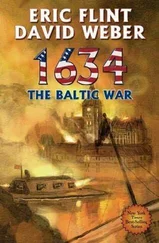Eric Flint - 1812 - The Rivers of War
Здесь есть возможность читать онлайн «Eric Flint - 1812 - The Rivers of War» весь текст электронной книги совершенно бесплатно (целиком полную версию без сокращений). В некоторых случаях можно слушать аудио, скачать через торрент в формате fb2 и присутствует краткое содержание. Жанр: Альтернативная история, на английском языке. Описание произведения, (предисловие) а так же отзывы посетителей доступны на портале библиотеки ЛибКат.
- Название:1812: The Rivers of War
- Автор:
- Жанр:
- Год:неизвестен
- ISBN:нет данных
- Рейтинг книги:4 / 5. Голосов: 1
-
Избранное:Добавить в избранное
- Отзывы:
-
Ваша оценка:
- 80
- 1
- 2
- 3
- 4
- 5
1812: The Rivers of War: краткое содержание, описание и аннотация
Предлагаем к чтению аннотацию, описание, краткое содержание или предисловие (зависит от того, что написал сам автор книги «1812: The Rivers of War»). Если вы не нашли необходимую информацию о книге — напишите в комментариях, мы постараемся отыскать её.
1812: The Rivers of War — читать онлайн бесплатно полную книгу (весь текст) целиком
Ниже представлен текст книги, разбитый по страницам. Система сохранения места последней прочитанной страницы, позволяет с удобством читать онлайн бесплатно книгу «1812: The Rivers of War», без необходимости каждый раз заново искать на чём Вы остановились. Поставьте закладку, и сможете в любой момент перейти на страницу, на которой закончили чтение.
Интервал:
Закладка:
The Ridge had seen the sea, several times since his youth, and had never forgotten the inexorable power of the tides. They couldn't be stopped, certainly. But perhaps they could be channeled.
Perhaps.
John Ross was somewhat in awe of The Ridge, and so he took his cue from his older companion's unreadable countenance, and his still manner of watching things.
"Stoic." That's what white Americans would have labeled The Ridge. The word wouldn't have meant anything to the man himself, since he spoke no En-glish and was basically illiterate. But John himself was fluent in English-more so than he was in Cherokee, in fact-and he was a voracious reader.
Still, John was a Cherokee, and he thought like one. So he knew that "stoic" was a misnomer. The Ridge's manner did not derive from the ancient philosophies of the Romans, whom most Americans saw as their political forefathers. John Ross had read some of those Roman texts in school, as did most educated children, but he was sure The Ridge had never even heard of them.
No, The Ridge's manner came from the traditions of his own people. The stillness of hunters waiting for prey; the patience of the river bottoms where a people grew its beans, squash, and corn.
The Ridge was in his early forties. He was well known among the Cherokee as an advocate of finding workable compromises with the whites, and even adopting many of their practices, when it made sense. But, in other ways, he was something of a throwback. One of the great ancient ones, John Ross liked to imagine, come back to life in the Cherokee time of need. The Ridge wasn't entirely a pureblood, since his mother's father had been a Scot frontiersman. But there was no trace of that ancestry in his form and figure. The Ridge was as dark-skinned as any Cherokee, with the dramatic nose and cheeks to go with his powerful build. He'd been named for his hunting prowess. "The Ridge" was an English translation of the Cherokee Kahnungdatlageh, which meant "the man who walks on the mountaintop."
He had been a blooded warrior at the age of seventeen, killing one of the white Tennesseans who had been allied with the Unakas. By the time he was thirty, he was one of the Cherokees' most influential chiefs. He was often referred to as asga siti. The term was usually translated into English as "dreadful," although for Cherokees themselves the connotations were more that of "terrifying" or "formidable."
Still, The Ridge had for at least a decade been the principal voice among the Cherokee, advocating an end to the ancient Blood Law that kept the Cherokees-like most Indian nations-continually embroiled in clan feuds.
John's own musings were interrupted by new movement at the entrance to the general's tent. Two more American officers were emerging.
The Ridge was already studying them. One of them, rather.
The man on the left, John Coffee, wasn't the object of his scrutiny-he was already well known to the Cherokee. It was the young officer who accompanied Coffee whom The Ridge found interesting.
Physically, at least, he was certainly impressive. Very tall, broad-shouldered, and with a muscular physique. But The Ridge could outwrestle almost any man he'd ever met, so that was of no interest to him. Instead, he focused on the young officer's face.
That face had possibilities, he decided. The blue eyes looked to be intelligent, and the mouth seemed to be one that smiled easily. Better still, one that could tell jokes.
"Is that the one?"
John Ross nodded.
So.
The adopted son of Oolooteka, "he who puts the drum away"-or John Jolly, as he was often called. John Jolly was a fairly minor chief among the Cherokee, but his older brother Tahlonteskee wielded great influence. Mostly a bad influence, The Ridge thought, since Tahlonteskee was the most prominent advocate of moving the tribe to the West. Indeed, Tahlonteskee had already done so, leading a thousand people in his own clan across the great river into the region the Americans called Arkansas.
At best, The Ridge thought the decision had been premature. But Tahlonteskee wasn't the only one who was advocating that course of action. His younger brother John Jolly did so as well, although he hadn't yet made the move himself. Their position was especially influential among the purebloods.
So.
"I think we will talk to him," The Ridge announced.
John Ross started to rise. The Ridge placed a hand on his forearm and drew him gently back down. "Not now. After the battle."
Ross shot him a questioning glance. The Ridge allowed himself another little smile. "Whatever else is different about Americans, one thing is not. They prize courage as much as we do. So. After the battle. He will be a great deal older then than he is now, once that day is over, and everyone will know a great deal more about him."
Finally, Sam couldn't keep the question from bursting out.
"He was faking it?"
As they walked away from Jackson's tent, General Coffee cast the young ensign a sidelong stare.
"I have known Andy Jackson for ten years, both as a friend and a business partner. I married his wife's niece, and I fought a duel with Dickinson's friend McNairy two months before Andy killed Dickinson. I know him as well as anyone does. Andy Jackson doesn't fake anything.
"It's just…" Coffee looked away, as if gathering his thoughts. "It's a little hard to explain. Let's just say that the general is a lot smarter than most people think he is."
Something in Sam's face must have made it clear that he wasn't satisfied with the explanation. Coffee issued a little chuckle.
"All right, then let me put it this way. With Andy Jackson, you just never know. He does, in fact, have a temper that can shake buildings. And he can be as cold-blooded and ruthless as anyone you'll ever meet. You heard about the time a company of militiamen tried to march back to Tennessee-it happened last November-because their term of enlistment was up? Andy rode out on his horse, planted himself square in front of them, and leveled his rifle at them. Said he'd shoot the first man who took another step."
Sam nodded. By now, the story was famous-notorious, more like-all over the frontier. He'd even heard that it was stirring up a ruckus in Washington, D.C.
"And there's the time Hall told Jackson his brigade was planning to desert-this happened at Fort Deposit, a month later. The story goes that Jackson had two cannons trained on them. Then mounted his horse and swore that he'd have them fired on, despite the fact that he and his horse were right there in the line of fire. You heard that one, too, I'd wager."
Sam nodded.
"Well, both stories are absolutely true. In every detail. I was an eyewitness to the first one myself. And I can tell you there wasn't a single one of those militiamen who doubted for a minute that Andy would pull the trigger. They don't call him 'Old Hickory' for nothing."
The two men walked on in silence for a moment, negotiating their way around a group of soldiers who were squatting at a campfire. After they were past, they found themselves picking their way a little more slowly, now that the sun had set. Coffee spoke again.
"You just never know, that's the point. And that's the way Andy likes it. Did they tell you when you were a kid that bullies are always cowards?"
Sam laughed softly. "Yeah, but I didn't believe it, even then."
"Smart lad. It's pure horseshit-and Andy Jackson is the living proof of it. He's a ferocious bully, and he's a sneaky, conniving bastard who won't hesitate for a second to trade on that reputation. But he doesn't have a cowardly bone in his body. Even his fingernails have guts."
Coffee stopped then and turned to face Sam straight on. The general was as big as Houston, so their eyes were on a level. There was still enough light shed by the sundown to enable Sam to make out his features. Coffee's round face was surmounted by a mass of black hair and centered on a prominent nose. He had very dark eyes. Despite the natural solemnity of the face, Sam thought he detected a trace of a smile playing across the general's lips.
Читать дальшеИнтервал:
Закладка:
Похожие книги на «1812: The Rivers of War»
Представляем Вашему вниманию похожие книги на «1812: The Rivers of War» списком для выбора. Мы отобрали схожую по названию и смыслу литературу в надежде предоставить читателям больше вариантов отыскать новые, интересные, ещё непрочитанные произведения.
Обсуждение, отзывы о книге «1812: The Rivers of War» и просто собственные мнения читателей. Оставьте ваши комментарии, напишите, что Вы думаете о произведении, его смысле или главных героях. Укажите что конкретно понравилось, а что нет, и почему Вы так считаете.











